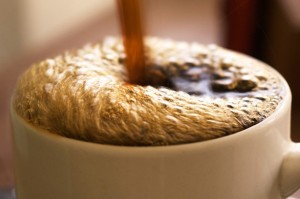Tagged: Caffeine
More Buzz For Your Buck: Maximizing Your Caffeine Intake
While up to our ears in physics homework last week, my roommate and I had a chat or two about caffeine. And I wondered (as I poured a cup of coffee), is there a way to brew this stuff to maximize the caffeine I end up drinking? After Wednesday, exam day, a day that included a shameful amount of caffeine, I became curious as to its nutritional or even neurological value…or perhaps just hopeful that it had some. Maybe this isn’t neuroscience news per say, but it’s certainly a curiosity, and certainly relevant to my success in “Elementary Physics I”.
I was sure I wasn’t alone in my caffeine-chemistry quest and figured there must be sufficient research published to generate some answers. As it turns out, in 1996, Leonard Bell et al. at Auburn University conducted a study with the aim of improving epidemiological analyses of caffeine intake by allowing researchers to control for the effect of brewing methods on caffeine content. It’s an interesting read, perhaps in part because the “Materials and Methods” section starts out with buying coffee beans at a local grocery store and proceeds to (very methodically) describe various ways of making coffee. More
Caffeine: The Good, The Bad, and The Ugly
Fatigue comes in all shapes and sizes, and sometimes it can appear in the case of the college student. Menacingly staring at the computer, eyes fixated on making sure the final paper meets the suggested word count, the college student desperately tries to block out the urge and addiction of distractions. Yet as the night sky soon turns bright with the rising sun, the college student's attention shifts more and more from the task at hand, to the preparation of the pick-me-up beverage of choice, caffeine. With only minutes before the first morning class, the college student is faced with the harsh reality of selecting his weapon of choice. Will he run across the street, bracing the brutal winds to grab a caffe mocha with a double shot of espresso, or play it conservative, and go for it with the 5 hour energy shot or name brand energy drink?
Soda, coffee, and energy drinks are the three main drinks that come to mind when thinking about caffeine. But besides these drinks, caffeine has shown to be increasingly prevalent in different foods covering multiple food groups. While most people concede to the negative attention these beverages receive, caffeine is a three - headed monster that yields both positive and negative effects. Thus the real question should be, do you want the good or the bad news first?
 Starting with the good: caffeine can increase your short-term memory and alertness while also altering your overall mood. The caffeine in one cup of coffee can stimulate the central system as it simultaneously lowers blood sugar, thus creating a temporary lift. Further research conducted by the Journal of Sports Medicine showed how "caffeine taken two hours before exercise enhanced the performance of athletes in marathon running." Yet another study published in the Journal of the American Medical Associated indicated that "people who drink coffee on a regular basis have up to 80% lower risks of developing Parkinson's disease."
Starting with the good: caffeine can increase your short-term memory and alertness while also altering your overall mood. The caffeine in one cup of coffee can stimulate the central system as it simultaneously lowers blood sugar, thus creating a temporary lift. Further research conducted by the Journal of Sports Medicine showed how "caffeine taken two hours before exercise enhanced the performance of athletes in marathon running." Yet another study published in the Journal of the American Medical Associated indicated that "people who drink coffee on a regular basis have up to 80% lower risks of developing Parkinson's disease."
On the contrary, caffeine does have a dark side. Caffeinated foods can contribute to a person's struggle with either weight gain or hunger. The stimulant itself is known to increase appetite, to increase cortisol levels, and to increase levels of insulin. Any of these factors may combine with a caffeine-induced stress that often affects the results of dieters, being that caffeine is a natural diuretic which can lead to water retention. Caffeinism, as it is often referred to, can come in waves of migraine headaches and sickness, which in turn can cause nervousness and a rapid heartbeat. So does this mean that you shouldn't have a cup of coffee in the morning? My response is no.
Ahhh coffee, such a misunderstood luxury. Caffeine, within coffee beans, has shown to be a leading source of both brain and body health benefits, specifically playing the role of your average American's number one source of antioxidants. In fact, regular coffee consumption has shown to dramatically reduce the chance of mental heath risks including Alzheimer's and Dementia. However, coffee is one of those things that is always looked down upon as if it induces the same affects as alcohol. The real problem lies not with the coffee, but with all the other unhealthy ingredients that it can be mixed with. For example, which sounds healthier, a strait shot of Espresso or a Cinnamon-Dulce-White-Mocha-Frappucino, cream based. Now when you compare the carb, chemical, and fat information of the two with the purity of the first, the controversy over coffee is plain and simple.
In essence, caffeine is one of those things that must be taken in moderation. While caffeine contains both positive and negative extremes, a balanced consumption of caffeine through artificial drinks or coffee in its purest form, seems to be just fine, especially with the college students.
Caffeine - K. Cossaboon
Foods Containing Caffeine - Ella Rain
Brain Healthy Foods - Brain Ready
